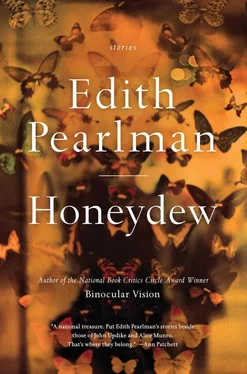What Daphna did say was some version of this: “Shalom, dear friend. Scandals here, scandals back in Jerusalem, and the French minister of tin cans was found in bed with his biographer. All politics is local, the gentleman said. Local? Smaller yet: household, if you ask me, though who asks me. My gutters are clogged with leaves. I can’t stay long — cranberries are simmering on my stove.” Cranberries were frequently simmering on her stove, and were often forgotten there. Sometimes on trash-collection day, Daphna’s pile of newspapers was topped with an aluminum pot whose interior was glazed an unscrubbable purple. “More than two million bushels of cranberries are produced each year,” she might go on. “The plant is cultivated on acid soils of peat or vegetable mold. Such scrupulous recycling of natural elements — it is as if the Talmud decreed it. The Hebrew word for cranberry is hamutsit. The French is canneberge . The Linnaean term is…” The briefest pause here perhaps — during which opportunity, still in my backyard, I claimed to hear the telephone ringing; or, leaning against her jamb, Sylvia softly belched; or, at her window, Lucienne, adjusting her scarf, mentioned that it was time for a nap; or, sliding open the glass door to the deck, Connie indicated in her flat Wisconsin accent that the monologue might continue inside.
It continued inside anyway, whatever any of us did, as Daphna followed me into the house, cocking her head at the silent telephone; or advanced on Sylvia; or ignored Lucienne’s invented fatigue until the poor woman plodded to her back door and opened it. “… Vaccinium macrocarpon, the Linnaean cranberry.” By this time Daphna was seated at Sylvia’s breakfast table, Lucienne’s, Connie’s, or mine; and Sylvia, Lucienne, Connie, or I was seated opposite her, our fingers splayed on wood or cloth. We gazed at the backs of our hands. We avoided eye contact with her as we would with a rabid dog.
“Politics, you were saying?” Daphna remarked. “The things husband says to wife at breakfast, wife to husband, determine the course of the day, the year, the nation; they influence everything from some grocery clerk’s nervous mistake to the idiocy which commands our destinies.” She leaned forward. “They influence the policeman on the beat.” She leaned farther forward. “My youngest child has the highest mathematical aptitude of all eleven-year-olds in the town of Godolphin.” Another of her boastful hyperboles. “What shall I do about the leaves in my gutters?”
She had quantities of brown frizzy hair and a perfect lozenge of a face — brow narrow, chin narrow, cheekbones curved like almonds. Her large gray eyes were calm as water, her full lips about to froth. She favored ankle-length skirts and long overblouses, wore sandals in winter and no shoes at all the rest of the time. She might have stepped out of the pages of a child’s illustrated Old Testament, just as her husband might have stepped out of a photograph taken in 1890 on Hester Street: an immigrant tailor, wearing black pants, black vest, white shirt, and a little beard. No skullcap, though. They were not pious, Daphna assured me — their Friday-night meal was simply a reenactment of Jerusalem life. “Every family, the godless, the frum, they all sit down together Erev Shabbat. To interrogate each other. It’s our tradition.”
They were thorough Jerusalemites, she said, all born there — Avner during the Mandate, Daphna during the Suez Crisis, the older girls during the First Intifada, the third during the Madrid Conference. They had lived in a beautiful part of the city: “Stones so golden they are almost pink, like very expensive face powder.” Then Avner accepted the offer of a professorship of political science at the university here, and they arrived pell-mell in August, and somebody gave them my name, and I sold them the crumbling stucco house on my own swab-shaped street. Its feeble owners, after boldly installing a new furnace, had entered a nursing home. For house and furniture they’d take a low price. A low price was what they got.
Avner was sixty years old. Daphna was forty-five. How, once upon a time, had the little scholar won the tall beauty? We didn’t have to speculate. “Ah, my Avner, his mind makes me think of a high-rise hotel, on every floor something is going on. I was twenty-six. He proposed on Mount Gilboa. We had climbed to look at the irises. I ran through the fields. He ran after me. He proposed again on Ben Maimon Street, under a eucalyptus. Again on Rav Kook Street. He asked for my hand from my father, in my father’s house, in my father’s study lined with books in seven languages, no, nine, no, eleven, he speaks ten, my beloved Abba, there’s one he only reads. And that one is? you inquire,” she might demand of whichever neighbor was at that moment studying her own knuckles at her own breakfast table. “Persian.”
Daphna seemed to consider the four of us one woman — one ear, really — though she acknowledged certain individual attributes. Lucienne, who’d had a French mother, knew about sauces. Connie the social worker could recommend a course of action to take with a daughter’s brief defiance. (In fact Connie made no recommendations; she kept her mouth locked, like her briefcase.) When Sylvia wasn’t drinking she was thinking. She had grown up on the campus of Swarthmore College, where her father had taught philosophy; she was acquainted with meaning. She was probably acquainted with sorrow too.
And I? “You are American royalty,” Daphna said. “You are a direct descendant of John Adams, I know that for a fact.”
It is a fact. It is another fact that the Adams descendants number in the thousands. And there is a third, unrelated fact, an odd one: though I avoided Daphna, as did my three neighbors, because, as Sylvia said, give her a sip and she’ll gulp you entire; because, as Lucienne said, she’s dérangée; because, as Connie said, her intensity makes you feel charred — an insightful remark, though it slid with no emphasis from Connie’s mouth, as if it were a standard lease form received on the fax…though I avoided her, I did half enjoy — well, quarter — the times I got captured. Her nonstop talk included celebrity gossip (she knew something about everyone in the universe); bits of information like the word for “cranberry”; and comments about her dry motherland. “We are parched, we worship water, our phlegmy consonants are the result of our nonlubricated pharynx.” A change, this dérangée stuff, from my usual conversations about mortgage rates and bridge loans and house footprints and zoning bylaws. A change from Rand’s solemn pronouncements about the decline of civility in the Western world.
“Every time we look around, Avner is being summoned to the councils of the great. He is great himself.” Certainly the little tailor traveled often. We imagined him at unworldly academic conferences. When he was away, his females ate tuna fish out of the can every night. “He has embezzled my dreams,” she said. “I am his favorite,” she told me. “His favorite thorn,” she told me. “His favorite demon,” she told me, told me, told me.
Saturdays we were safe from her. Avner and Daphna disdained synagogue worship, but the family devoted Sabbath mornings to scriptural study at home and the afternoons to those shopping trips led by the daughters. Sunday mornings they all cleaned the house. But the rest of the day we were at risk. On Sunday afternoons — at other times too — Daphna occupied herself by vigorously sweeping her seven front stairs. Sometimes she mopped them as well, and then swept them again. Depending on the season she engaged in conversation with the widower on one corner clipping his hedge or the elderly bachelor on the other corner shoveling his snow. The conversation would be conducted in a yell, woman to old man, old man to woman. Soon, though, Daphna would walk diagonally across the street to the hedge trimmer or down the street to the shoveler, dragging her broom like a nightmare tail. Eventually the chosen man would go indoors, probably to pour himself a stiff drink. Then Daphna would select one of us. Maybe Lucienne in the house next to hers (“handsome Tudor,” I’d say, if I ever had to sell it). Maybe Sylvia in the neglected house directly across the street (“Victorian fixer-upper”). Maybe Connie, next to Sylvia (“Colonial with deck, mint condition”). Maybe me, located at the end of our cul-de-sac like a hostess (“split-level charmer”).
Читать дальше












